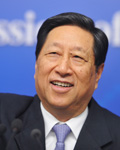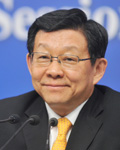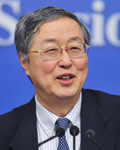|
 |
 |
 |
|
Zhang Ping |
Chen Deming |
Zhou Xiaochuan |
At the sidelines of the First Session of the 12th National People's Congress held from March 5 to 17, Zhang Ping, Minister of the National Development and Reform Commission, Chen Deming, Minister of Commerce, and Zhou Xiaochuan, Governor of the People's Bank of China, answered questions on economic and financial issues at separate press conferences. Edited excerpts of their answers follow:
Going Ahead With Reforms
Reform and opening up are fundamental forces that drive China's development and progress. Over the past three decades, China has made significant achievements in improving people's livelihood, increasing overall national strength and raising productivity. Without a doubt, credit should go to China's reforms.
The 18th National Congress of the Communist Party of China put forward the goals of finishing its plans to build a moderately prosperous society and having a relatively complete socialist market economy in place by 2020. To achieve these goals, China will continue to focus on reforms.
The focus of restructuring the economic system should be on managing the relationship between the government and the market. That is to say, the market should play a more profound role in resource allocation and the government should further improve macroeconomic control.
As Premier Wen Jiabao pointed out when delivering the government work report on March 5, reforms should be carried out in the following aspects. We need to improve the economic system by consolidating and developing the public sector and supporting and guiding the development of the private sector. We should deepen reform of state-owned enterprises, fiscal and taxation systems, financial system, investment and financing systems, pricing mechanism, public institutions and income distribution.
Boosting Consumption
Expanding domestic demand will remain China's long-term strategy for economic development. China will stimulate domestic consumption and improve the efficiency of government investment in order to expand demand.
Consumption has played an increasingly important part in economic growth. In 2012, consumption contributed 51.8 percent to the country's GDP growth, overtaking the 50.4 percent contributed by investment.
The government will work to create more jobs in cities and boost salaries in a way that won't damage enterprises' efficiency.
In rural areas, the government will raise the state purchase price of farm produce this year and make it easier for rural residents to work in urban areas.
More public spending on education, social security and healthcare will reduce the need to maintain large savings accounts and increase people's will to spend.
The government will also focus on infrastructure that benefits people's lives, such as public housing, hospitals, schools and the renovation of dilapidated houses in rural areas.
Embracing the Outside World
Opening up must benefit China's efforts to transform its economic development pattern and adjust its economic structure. It must also facilitate China's development, reform and innovation.
Opening up is meant to bring the global market to China, and our companies will encounter a more heightened market competition in the process. But such competition will increase our strength and enable us to better participate in global cooperation.
To further open up, priorities will be given to the following. China will open up new sectors, such as the service sector, and open up more regions, including inland areas and border areas; it will balance foreign trade by stabilizing exports and expanding imports; it will open up its capital account to attract foreign investment, while paying particular attention to the "going out" strategy (overseas investment).
In addition, China will participate in global economic governance to preserve a multilateral trading system, establish free trade zones and institute a fair and open international trade environment.
Currently, China is negotiating with the United States on a bilateral investment protection agreement. It is pressing forward in free trade zone talks with the Regional Comprehensive Economic Partnership, which involves the 10 ASEAN member states, as well as China, India, Japan, the Republic of Korea and Australia. China is also engaged in free trade zone talks with Australia and six Gulf nations, and it has nearly completed negotiations on free trade agreements with Iceland and Switzerland.
| 